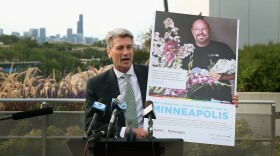
Cheryl Corley
Cheryl Corley is a Chicago-based NPR correspondent who works for the National Desk. She primarily covers criminal justice issues as well as breaking news in the Midwest and across the country.
In her role as a criminal justice correspondent, Corley works as part of a collaborative team and has a particular interest on issues and reform efforts that affect women, girls, and juveniles. She's reported on programs that help incarcerated mothers raise babies in prison, on pre-apprenticeships in prison designed to help cut recidivism of women, on the efforts by Illinois officials to rethink the state's juvenile justice system and on the push to revamp the use of solitary confinement in North Dakota prisons.
For more than two decades with NPR, Corley has covered some of the country's most important news stories. She's reported on the political turmoil in Virginia over the governor's office and a blackface photo, the infamous Trayvon Martin shooting in Florida, on mass shootings in Orlando, Florida; Charleston, South Carolina; Chicago; and other locations. She's also reported on the election of Chicago's first black female and lesbian mayor, on the campaign and re-election of President Barack Obama, on the devastation caused by Hurricane Katrina and oil spills along the Gulf Coast, as well as numerous other disasters, and on the funeral of the "queen of soul," Aretha Franklin.
Corley also has served as a fill-in host for NPR shows, including Weekend All Things Considered, Morning Edition, and defunct shows Tell Me More and News and Notes.
Prior to joining NPR, Corley was the news director at Chicago's public radio station, WBEZ, where she supervised an award-winning team of reporters. She also worked as the City Hall reporter covering the administration of the city's first black mayor, Harold Washington, and others that followed. She also has been a frequent panelist on television news-affairs programs in Chicago.
Corley has received awards for her work from a number of organizations including the National Association of Black Journalists, the Associated Press, the Public Radio News Directors Association, and the Society of Professional Journalists. She earned the Community Media Workshop's Studs Terkel Award for excellence in reporting on Chicago's diverse communities and a Herman Kogan Award for reporting on immigration issues.
A Chicago native, Corley graduated cum laude from Bradley University in Peoria, Illinois, and is a former Bradley University trustee. While in Peoria, Corley worked as a reporter and news director for public radio station WCBU and as a television director for the NBC affiliate, WEEK-TV. She is a past President of the Association for Women Journalists in Chicago (AWJ-Chicago).
She is also the co-creator of the Cindy Bandle Young Critics Program. The critics/journalism training program for female high school students was originally collaboration between AWJ-Chicago and the Goodman Theatre. Corley has also served as a board member and president of Community Television Network, an organization that trains Chicago youth in video and multimedia production.
-
Women and Children First has weathered more than three decades of competition from chain stores and online booksellers to become one of the largest feminist bookstores in the U.S. Now, the Chicago store is among the few of its kind left standing — and it's on the hunt for new ownership.
-
Polling shows that many Americans aren't quite sure how the Affordable Care Act will affect them, and it may be even more confusing for immigrants and people who don't speak English as their first language. Illinois has a large immigrant population, and the state has been working to resolve language barriers as it gets ready to launch its insurance marketplace.
-
Same-sex marriage is legal in Minnesota, but not in Illinois. That has Minneapolis Mayor R.T. Rybak on a mission to attract gays and lesbians to spend their wedding dollars in his city.
-
The strategist behind the 1963 march will posthumously receive the Presidential Medal of Freedom this year. As a gay man, his position in the movement was questioned. But now he is considered "an amazing role model" for activists of color who are also gay, lesbian, bisexual or transgender.
-
In Chicago, there's a 2.5 mile roadway that the city's mayor calls the "Bat Cave." It's been around for more than a decade but it's more secret than public. The mini-highway was designed to ferry conventioneers to Chicago's massive McCormick Place convention hall. It's also a favorite of politicians with just the right amount of clout. Now, some want taxis to have access too.
-
NPR conducted the poll of African-American communities with the Robert Wood Johnson Foundation and the Harvard School of Public Health. While the gap between the well-off and poor in the U.S. has stretched wide in recent years, we found that black Americans describe their financial divide as a nearly 50-50 split, and it affects how they view the world.
-
The city has torn down all of its high rises and says it's close to completing its plans to transform public housing. Chicago leaders want to use public housing funds to build not just homes for poor families, but stores as well. However, some say that breaks a promise to provide affordable housing.
-
The Chicago school board voted to close dozens of schools, despite community protests that the closings disproportionately affect minority students. Now the teachers union and community activists want to change the system and oust the elected officials who disagreed with them.
-
The museum, already hard-hit by the economic crash, didn't meet projected fundraising and attendance numbers, and now must make up a $5 million budget deficit. The shortfall forced it to sell some items in its renowned collection.
-
The first lady gave a personal and emotional speech in her hometown, two months after attending the funeral of a Chicago teen who was shot and killed earlier this year. Michelle Obama is encouraging business leaders to donate millions of dollars for programs to help at-risk youth.






